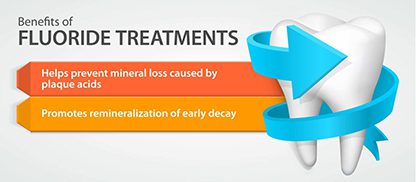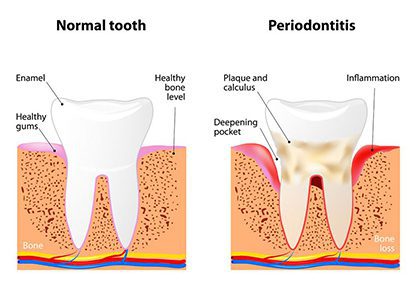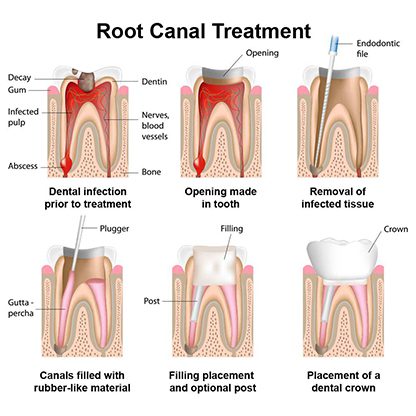Effective General Dentistry in Phoenix, AZ

Serving patients in Phoenix and the surrounding communities, Dr. Dovgan provides an array of general, cosmetic, and restorative dentistry services with a focus on helping our guests achieve optimum oral health. We aim to give our patients comprehensive preventive and general dentistry care in Phoenix that helps detect potential conditions and diseases as early possible while also protecting the entire oral health system with preventive treatments. In addition to thorough checkups and cleanings, we offer preventive care such as fluoride treatments, dental sealants, and night guards.
On top of committing to living a healthy lifestyle complete with eating a balanced diet and practicing proper oral hygiene, people should receive two checkups and cleanings a year to increase the likelihood of early detection of potential problems and preserve the health of teeth and gums.
Professional cleanings are necessary because home care is not enough to remove harmful substances that contribute to tooth decay and periodontal (gum) disease. During cleanings, our dental hygienists will gently scrape away tartar and plaque without damaging the surface of teeth. Teeth will then be polished with clinical grade tools. Like checkups, cleanings are an opportune time to look for signs of common conditions like gum disease, tooth wear, and thinning tooth enamel.
Some folks may underestimate the importance of a dental checkup. During oral examinations, our dentist will screen for many conditions and diseases that can threaten oral health and general wellbeing. If conditions such as decay are detected in the early stages, we can often resolve them with fillings or other simple treatments. We also provide root canal therapy to treat advanced decay and eliminate the need for tooth extraction.
In addition to evaluating the health of teeth, gums, and facial bones, Dr. Dovgan will perform an oral cancer screening. When oral cancers are detected and treated early, it can literally save a person’s life.
Preventive Care
Preventing disease is a major focus at our practice. Stopping the development and advancements of conditions like tooth wear, gum disease, and cavities can save our patients’ time and money as well as their oral health.
To help strengthen teeth and prevent decay, Dr. Dovgan may recommend a variety of general dentistry Phoenix treatments, including fluoride treatment or the application of a dental sealant. Fluoride is used to strengthen tooth enamel while a sealant is used to fill in the grooves and pits of a tooth to prevent decay.
Night guards are also helpful. These oral appliances are worn during sleep to protect teeth from scraping against one another since many patients grind and clench their teeth at night. A custom night guard can prevent tooth wear and enamel damage, both of which contribute to the development of injured and decayed teeth.
To schedule a cleaning or checkup with our caring and experienced team, call our practice today.

Dental sealants are a thin plastic coating that can be applied to the grooves and depressions of back teeth to prevent cavities. At our Phoenix, AZ practice, Dr. John W. Dovgan can provide effective dental sealant treatments for both children and adults. Our team is committed to excellent patient service, and has been serving our community since 1989.
Dental sealants are beneficial for children and adults alike.
Back teeth often have deep grooves, pits, and fissures in their chewing surfaces, which are difficult to reach with a toothbrush. Bacteria, debris, and plaque can become trapped in these areas, resulting in tooth decay. Dental sealants are essentially painted onto the chewing surfaces of the teeth to prevent these vulnerable areas from becoming compromised.
Dental sealants are beneficial for children and adults alike. Decay in the pits and fissures of teeth can begin at an early age. For this reason, sealants are recommended as soon as the permanent teeth have fully erupted. A small investment in this treatment can prevent the need for costly treatment in the future. In fact, most insurance providers will contribute or completely cover the cost of the procedure. You can depend on our caring team to speak to your provider and advocate for the most coverage possible if you wish to receive dental sealants or undergo any other preventative treatment.
Dental Sealants Treatments
Placing a dental sealant is a simple procedure that typically takes only a few minutes. When you have dental sealants placed at our practice, treatment involves four basic steps:
- Cleaning the Teeth: Before receiving your sealant, your tooth will be thoroughly cleaned and dried to avoid trapping debris and bacteria.
- Preparing the Teeth: A slightly acidic solution, called dental etch, will be placed on the teeth to foster bonding. The solution will roughen the texture of the enamel, giving the sealant more surface area with which to bond. Next, the teeth will be rinsed and dried.
- Placing the Sealant: Dr. Dovgan will paint the sealant onto the teeth surfaces, making sure the material reaches into every pit and fissure.
- Curing the Sealant: The sealant will be hardened, or cured, using a special light. Once complete, your new sealant will blend with your dental tissue. Your dentist will check to make certain that your bite remains comfortable following the application of the sealant.
You can resume normal activity immediately following your dental appointment. However, hard, chewy, and sticky foods should be avoided for the first couple of days.

Dr. John W. Dovgan in Phoenix, AZ, provides professional fluoride treatments that can strengthen enamel and prevent cavities. These treatments can be beneficial for children and adults. Depending on the state of your oral health and your propensity for developing cavities, a fluoride treatment may be appropriate every three, six, or 12 months. Preventative dental care is vital to your oral health, and can save you from needing more extensive and costly treatments in the future. Our family-friendly practice has been serving the community for nearly 30 years. We take pride in providing quality dental care, and our team commits to creating a comfortable environment for the most pleasant experience possible.
Most insurance plans cover the cost of fluoride treatment for minors, making it a simple way to set the stage for a lifetime of outstanding oral health.
What is Fluoride?
Fluoride is a mineral found in water, air, soil, and living organisms. Most municipal water supplies contain added fluoride. In the field of dentistry, fluoride is used to strengthen the enamel of the teeth. When sugary foods are consumed, acidic bacteria levels rise, resulting in the demineralization of tooth enamel. Fluoride helps to remineralize your enamel, protecting your teeth from decay and keeping them strong and healthy.
Cavities and Your Oral Health
If left untreated, decay can cause cavities and infection, ultimately resulting in tooth loss. Certain factors can contribute to a higher risk of cavities. These include:
- Poor diet
- Poor oral hygiene
- Dry mouth
- Not visiting the dentist regularly
- Drug or alcohol use
Benefits of Professional Fluoride Treatment
Fluoride can be found in various over-the-counter products, such as toothpaste and mouth rinses. While these are useful in supplementing your oral health, professional fluoride treatments contain a higher concentration of fluoride and are recommended as a safe and effective treatment.
Receiving Fluoride Treatment
Professional fluoride is applied as a varnish, gel, or foam, and the treatment typically only takes a few minutes. Depending on the method used, the fluoride will either be applied directly to the teeth or placed in a mouth guard. After approximately five minutes, your teeth will be rinsed and dried. Dr. Dovgan may recommend avoiding food and beverages for about 30 minutes following treatment.

Keeping your teeth for a lifetime is a worthwhile goal—one that can be accomplished with the help of regular dental care. Because periodontitis is a common cause of tooth loss, it is important to diagnose and treat gum disease in the early stages. Dr. John Dovgan in Phoenix, AZ, offers periodontal treatment and preventive care to help patients maintain optimal oral health. If Dr. Dovgan detects the symptoms of gum disease during a routine exam, he can take the necessary steps to treat and eradicate the disease before it can progress and cause further damage.
Periodontal disease has been associated with serious medical problems, including heart disease and strokes; therefore, it is very important to seek dental care if you notice symptoms of gum disease.
About Periodontal Disease
Gingivitis is a fairly common oral health condition that is caused by the sticky plaque that naturally accumulates on teeth and gums. Symptoms of gingivitis can include mild redness, swelling, and bleeding when you brush. Untreated, the condition can turn into periodontitis, a more serious form of gum disease that can lead to bone and tooth loss.
Symptoms of periodontitis include:
- Increased swelling and bleeding
- Chronic bad breath
- Receding gum tissue
- Loose teeth
Periodontal disease has been associated with serious medical problems, including heart disease and strokes; therefore, it is very important to seek dental care if you notice symptoms of gum disease.
Patients with dental implants must also take care to treat periodontal disease, since in rare cases, the bacteria can affect the integrity of the implant. Peri-implantitis can cause destruction of the bone surrounding the implant, ultimately leading to failure of the restoration.
Periodontal Care by Dr. Dovgan
Gingivitis can be kept in check by maintaining a strict schedule of regular professional cleanings, along with practicing good oral hygiene habits. Dr. Dovgan may advise you to use antibacterial rinse and toothpaste as part of your oral hygiene routine. We can also provide laser treatment for bacteria reduction. Our laser technology includes a special tool that significantly reduces anaerobic bacteria along the lining of the mouth and gums.
Dr. Dovgan can determine your periodontal status with a visual and manual exam. He will check for pockets that form in gum tissue, which should normally adhere snugly to the surface of teeth. A measured depth of 4mm or more indicates connective tissue loss and signals the potential for bone loss.
Moderate periodontitis can be treated with a deep cleaning that includes scaling and root planing. Dr. Dovgan can use an ultrasonic hand instrument to remove bacteria and tartar from roots and inside deep pockets. He may also prescribe antibiotics along with specific instructions for home care. If you have serious gum disease, it is recommended that you see us every three to four months for maintenance treatment.
For serious periodontitis, Dr. Dovgan recommends laser assisted periodontal treatment (LAPT) with Biolase. Using this minimally invasive laser, he can remove inflamed tissue and calculus pockets quickly with minimal discomfort and no bleeding. The treatment promotes healing and new attachment of healthy gum tissue to the root surface.
Extreme cases of gum disease may require traditional surgery with bone grafting. Dr. Dovgan can perform full mouth reconstruction to return function and beauty to a compromised smile. We also offer effective sedation dentistry services to keep you comfortable and relaxed during all treatments.

A dental infection can be exceptionally painful, eventually leading to tooth loss and other oral health issues. Root canal therapy is a treatment that can save your tooth and prevent further infection. For over 25 years, Dr. John W. Dovgan in Phoenix, AZ, has been providing endodontic therapy to help his patients avoid the need for tooth extraction. Our entire team embraces a philosophy of excellent care, and we do everything we can to provide our patients with the most pleasant experience possible.
If you are experiencing a toothache or other symptoms of a dental infection, contact us right away, and we will schedule an appointment as soon as possible
When is Root Canal Therapy Necessary?
When the pulp (the inner tissue of a tooth) becomes infected due to advanced decay or trauma, it requires prompt treatment. If left untreated, the bacteria can spread to adjacent teeth and surrounding bone, causing further issues.
Common indications of a dental infection include:
- Pain or tenderness
- Discomfort when chewing
- Temperature sensitivity
- Drainage or pus
- Tooth discoloration
- Bad breath
- Swelling in the lymph nodes
It must be noted that dental infections do not always present symptoms. Routine dental examinations can allow us to monitor your oral health and provide prompt treatment.
Root Canal Therapy Process
A root canal treatment typically involves six fundamental steps:
- Assessment: During a consultation, Dr. Dovgan will examine the tooth, closely evaluating the surrounding gum tissue. X-rays will be taken to properly diagnose the problem and assess the roots and underlying bone structure.
- Anesthesia: If Dr. Dovgan determines that root canal therapy is necessary, local anesthesia will be administered to numb the tooth and surrounding tissues for your comfort.
- Access: A small opening will be made in the tooth to allow access to the pulp chamber and root canals.
- Cleaning: The pulp will be removed. Dr. Dovgan will clean the chamber and root canals of the tooth using tiny instruments, and will then disinfect the inner surfaces.
- Filling: Once the inside surfaces of the tooth are cleaned, the root canals will be filled with a flexible biocompatible material called gutta-percha. Your dentist may also place a post within the tooth to provide the filling with added support. Your tooth will then be sealed.
- Crown: A dental crown will be placed over the tooth for support and aesthetics. Because we have CEREC® technology, we can often provide a custom crown immediately following a root canal, eliminating the need for a temporary crown or follow-up appointment.
Recovery from Root Canal Therapy
Following root canal therapy, you may experience slight tenderness or sensitivity. However, most patients report minimal pain during recovery. Over-the-counter anti-inflammatory medications, such as ibuprofen or naproxen, can be taken to reduce swelling and discomfort. Pain usually subsides within a few days.
